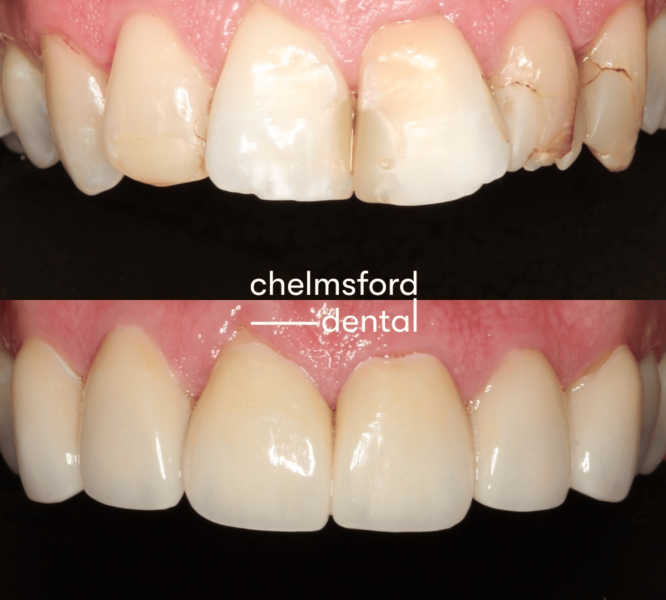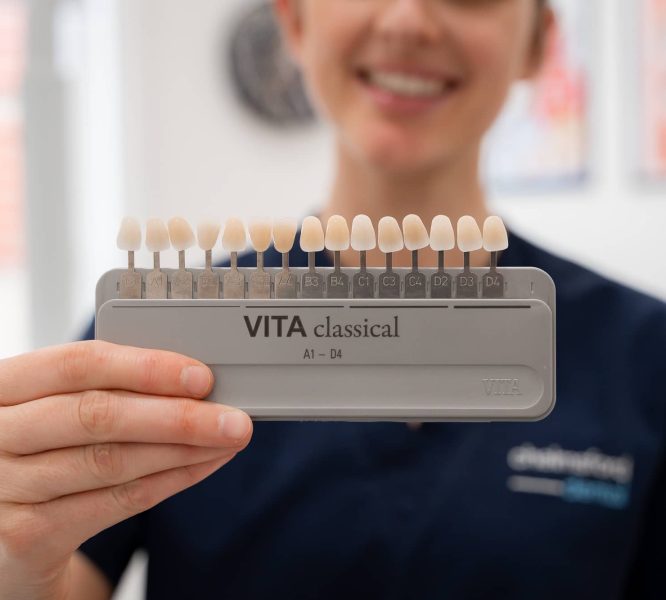If stained, uneven, or damaged teeth are impacting your everyday life and self-confidence, dental veneers may be a good option for you. Veneers are a popular cosmetic dental treatment for improving the overall appearance of teeth.
Dental veneers are custom, thin coverings that get bonded over a tooth’s surface.
This thin layer of material can cover up discolouration, imperfections, gaps, and damage, improving a smile’s look and function.
Veneers offer a durable, long-lasting solution to a wide range of cosmetic dental concerns, including:

Dental Veneers offer a whole variety of different benefits, these include:
Do you have misshapen, uneven or discoloured teeth? Do you want to achieve your dream smile?
This patient was not happy with the shape and discolouration of her teeth; with a combination of dental veneers and dental crowns she is now delighted with her smile.


Porcelain and composite are the two main types of veneers, both of which can improve your smile’s overall appearance. Each veneer type has its own pros and cons to consider when deciding which solution to choose. A consultation with your dentist is the best way to determine the ideal veneer type for your budget, teeth condition, concerns, and goals.
Here’s a quick glance at some of the advantages and considerations of porcelain and composite veneers:
The treatment process for veneers occurs in a minimum of 3 trips to the dentist. First trip will be a consultation while the second and third trips are all about applying them.
In order to prepare for a veneer, the dentist will trim the enamel, reshape the tooth’s surface, take an impression, make a model, and then send the model to a dental laboratory to create the veneer.
While your customer veneer is being prepared (this usually takes about two to four weeks), temporary ones can be used.
Once created, the dentist will examine the veneer in comparison to your natural teeth. Examining its fit and colour, trim it to achieve the best fit, and permanently cement it to your tooth. The colour can be adjusted by using different shades of cement.


Chelmsford Dental is owned by Dr. James Roberts. He is joined by his team of expert dentists and dental assistants. Chelmsford Dental is one of Perths most experienced and professional dental teams, specialising in a range of different general and cosmetic dentistry services, including Veneers, Dental Bridges and much more!
Chelmsford Dental is your dedicated family-friendly dentist in Perth and we look forward to helping you and your family experience a bright smile and excellent oral health. Contact us today to speak with one of our friendly team members about any of your questions or to book an appointment.
Getting veneers is often considered a virtually painless treatment. For most patients, a numbing gel is applied to the tooth’s surface so you can stay comfortable throughout the application process.
Once the veneers are bonded to your teeth, the area should be completely healed in two weeks or less. You may experience increased sensitivity to hot and cold foods and a slight change to your bite, but this usually resolves within a month as you get habituated to the veneers. If you experience pain or discomfort that lasts longer than two weeks, contact your dentist right away.
Maintaining veneers is similar to caring for your regular teeth. Following a good oral hygiene routine is essential to keeping your veneers and natural teeth healthy and free of decay.
In addition to brushing and flossing daily and seeing your dentist for regular checkups, here are other important ways to maintain veneers:
When maintained properly, dental veneers can have a long lifespan. Porcelain veneers can last between 10 to 15 years with proper care. Composite veneers generally have a shorter lifespan of around 4 to 7 years.
If you have chipped, stained, misshapen, or damaged teeth, veneers may be a good solution for you. However, if you have severe tooth decay, it should be addressed before you get veneers.
If you clench or grind your teeth at night, a condition known as bruxism, you may need a bite splint before your dentist applies veneers. The best way to find out if you need dental veneers is to set up a consultation with your dentist to discuss the health of your teeth, concerns about your smile’s appearance, and other factors.
Caring for your veneers properly and following your dentist’s instructions is imperative to preventing damage and maximising their lifespan. Two of the biggest issues that can shorten the lifespan of veneers are discolouration or breakage.
If veneers become chipped, cracked, or discoloured, they cannot be fixed. Damaged veneers will require replacement. If you notice cracks, chips, staining, or damage to your veneers, contact your dentist immediately.
When choosing a veneer colour, many patients opt to go about a shade whiter than their current smile. Once the veneers are applied, the natural teeth are whitened to match the brighter veneers, creating a bright, white, healthy-looking smile. However, whitening your natural teeth is temporary. With time, you may need to whiten your natural teeth again to match with your veneers.
Porcelain veneers are easier to match with natural teeth and reflect light similar to natural teeth, making them a better option if a natural appearance is your priority. Before getting veneers, discuss the outcome you are hoping for with your dentist to ensure you get the best treatment results.
Porcelain and composite veneers can both be effective solutions for damaged or discoloured teeth. Each type of veneer offers unique advantages and considerations to keep in mind. For the longest-lasting option, porcelain veneers are ideal. If budget is your biggest concern, composite veneers may be your best option.
Your dentist will evaluate the health and condition of your teeth to determine the ideal treatment plan for your budget and goals.
It’s advisable to avoid very hard or sticky foods to prevent damaging your veneers. Be mindful of habits such as chewing on pens or ice.
Your dentist will evaluate the health and condition of your teeth to determine the ideal treatment plan for your budget and goals.
The two main types of veneers are porcelain and composite. Porcelain veneers are more durable and stain-resistant, while composite veneers are more affordable and require less enamel removal.
Depending on the amount of teeth you need treated and your health insurance can determine the price for dental veneers in Perth. On average a full set of 8 veneers costs upwards of $8000, equalling just near $1000 a tooth.
Click here to contact us or more on Chelmsford Dentals veneer prices
Explore
© 2025 Chelmsford Dental Mount Lawley. All rights reserved. Privacy Policy. Web Design & SEO by Digital Hitmen.